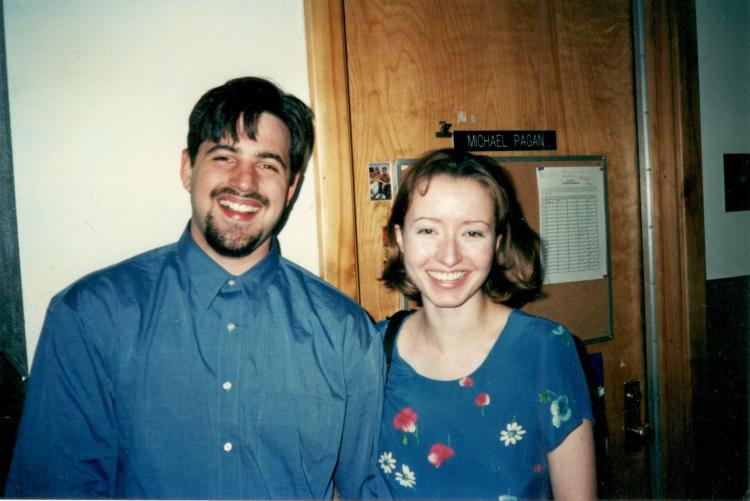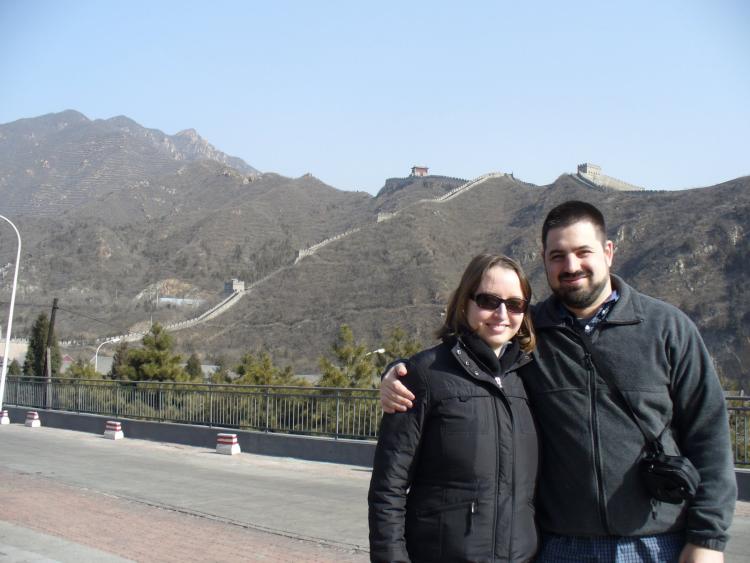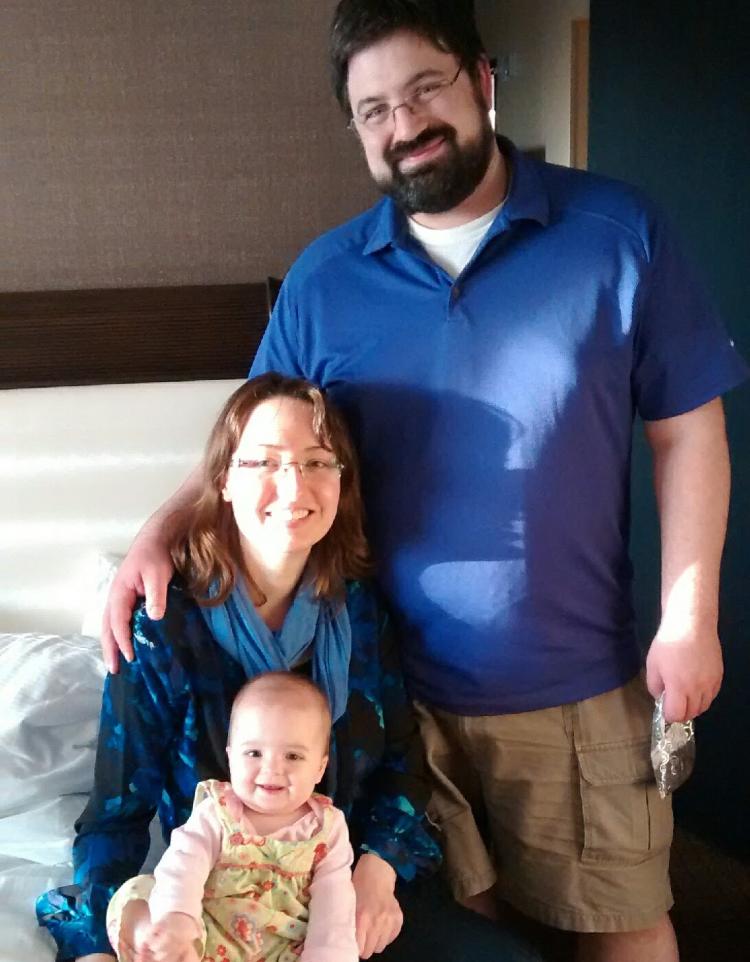Finding a way to help

Adam Schwalje and Sasha Garver as undergraduates at the College of Music
It’s perhaps not surprising that romance blossomed between two college musicians who spent as much time together as Sasha Garver and Adam Schwalje.
“We met as sophomores in Symphonic Band in 1998,” says singer and flutist Garver (BM ’02, DMA ’06). “We would smile at each other during rehearsal and he would leave his [bassoon] reeds lying around near me so that I’d have to come find him in the reed room to return them.”
“Pretty smooth,” laughs Schwalje (BM/BA ’01, MM ’02).
The couple started their careers in music, but they’ve since added a twist. Schwalje is finishing up medical school as a resident surgeon in the Department of Otolaryngology at the University of Iowa Hospitals. Garver, who still plays and teaches, has helped influence his research along the way.
“Music and medicine are really the perfect marriage for me,” Schwalje says. “Being a doctor is about teaching and it’s about empathy. I’m hearing impaired, and much of my work focuses on developing cochlear implants, specifically for musicians.”
Not surprisingly, Schwalje and Garver didn’t arrive in Iowa by following the straight and narrow. After years of crisscrossing the country finishing their studies, the pair set off in 2006 for Macau, China.

Garver and Schwalje at the Great Wall of China during their stint with the Macau Orchestra
“Adam got a call one day from an old professor who said there was a contrabassoon position open in the Macau Orchestra,” Garver says. “So we dropped everything and moved there, and after a few months I got the position as assistant principal flute.”
It turned out to be one of the most formative experiences of their lives.
“We got to tour all over Asia playing concerts and giving lectures,” Schwalje says. “We were invited to play as a flute and bassoon duo in India. Sasha was the featured clinician at the Suzuki World Conference in Melbourne. We learned so much.”
But much of what they learned was outside of music. It was eye opening to see how much of the rest of the world lives.
“I hadn’t been outside the U.S. and Canada prior to moving there,” Garver says. “I didn’t realize how much of the world lives in poverty. Music is incredibly important, but it’s unfortunately a luxury that so many people can’t afford.
“When we got home from that trip, we decided we both wanted to be proactive in society.”
And so they were. They moved next to Schwalje’s hometown of Santa Fe, New Mexico, where he taught band and science and she taught and chaired the music program at Northern New Mexico College.
“It’s an underserved area, and the college’s music program fed into the public education system,” Garver says. “We were surrounded by the northern pueblos, so the cultural sensitivity we got from living abroad helped in that situation.”
Schwalje, on the other hand, started to see another way to help people. “I was happy to have my double degree so that I could teach science, and that experience led to my decision to go to medical school at the University of California, San Francisco.”

Garver, Schwalje and their daughter at their home in Iowa City
Now he’s in his fifth year of medical school. His focus: Helping musicians who, like him, have moderate to severe hearing loss.
“My research revolves around cochlear implants. Right now, they’re designed for understanding speech, but not noisy situations—and not music,” he says.
It’s a field that resonates with him for a number of reasons. “For me, hearing loss, music, science … this is a chance to bring all of those parts of me together. I treat a lot of musicians and there is definitely something to be said for having that specialized knowledge about performance to help them move forward.”
Schwalje is also involved with the Society of Adult Musicians with Hearing Loss and the Association for Research in Otolaryngology. “I see my role as shifting to more advocacy, in addition to becoming a physician,” he says.
Garver, who continues to teach Suzuki flute in Iowa City as well as having a video chat studio of students in the San Francisco Bay area, Australia and Spain, presents with Schwalje at academic conferences on the physical issues faced by musicians.
“I actually got that foundation at CU while I was studying voice. I use the science of voice pedagogy in my flute teaching, and a lot of flute players don’t have that knowledge.”
For both Garver and Schwalje, helping people will remain an underlying goal in everything they do.
“I love that my skill set as a flutist and teacher has been able to take me all around the world to perform and work with children and teachers using the universal language of music,” Garver says. “It’s as Suzuki said: ‘Teaching music is not my main purpose. I want to make good citizens. If children hear fine music from the day of their birth and learn to play it, they develop sensitivity, discipline and endurance. They get a beautiful heart.’”
To read about more College of Music alumni, check out the 2017 edition of Colorado Music Magazine >>


